
21 minute read
A&E
WHEN THE WALLS FALL DOWN
Rising country star Justin Wells releases ‘The United State’
BY GARRET K. WOODWARD S TAFF WRITER
Sitting in a booth upstairs at The Water’n Hole on North Main Street in Waynesville one recent evening, Justin Wells takes two sips: one from his beer and one from his shot of bourbon.
A towering figure, in physical size and in sonic prowess, Wells is a proud Kentucky singer-songwriter, one whose latest album, “The United State,” is already making a rumble through the backwoods of Southern Appalachia and the bright lights of Nashville.
That afternoon, he stood in the rain (guitar in hand) in front of The Grey Eagle Music Hall in Asheville, filming a clip for his latest single and video “Walls Fall Down” — a call to action for the current #SaveOurStages recovery bill currently making its way through Congress (www.saveourstages.com).
With a staggering voice at the crossroads of George Jones and Hank Williams, Jr., Wells aims to bridge societal gaps with his presence, onstage and off. It’s about dissolving division and blurring the lines between “us and them,” to find common ground between friends, neighbors and strangers alike.
Relaxing into the dimly-lit barroom, he raises his head and smiles with a devil-maycare grin when asked about the life of a troubadour in uncertain times.
Smoky Mountain News: So, what is “The United State”?
Justin Wells: “The United State” is not boundaries on a map. It’s the state of being a human being. This isn’t new in 2020. Unfortunately, it’s ramping up. Sadly, this has always been the case — dehumanizing your opponent or dehumanizing the other, the things you don’t understand. When did it become so incredible to be in the room with somebody you don’t agree with?
SMN: See, I revel in that, because it’s the idea of learning something about not only myself, but society that maybe I didn’t realize.
JW: Of course. How would you ever find music, cuisine, verbiage and speech patterns if you weren’t around people different than you? I feel like it’s always adding clay to the basis. We don’t come in and vacuum: artists, writers, politicians, whatever. It’s always built on the backs of whoever else.
And it’s OK to improve or try to improve. It’s OK to be unique. But, we don’t have to break down the other. I’m just trying to point out that we are human beings. There’s an end and there’s a beginning, and it’s OK to disagree.
SMN: Where back in the day it was, “I disagree with you, but I still respect you.” And nowadays it’s, “I disagree with you, so I automatically hate you.”
JW: Yeah. What is that? Where did that come from? How did we get here? As a student of history, this has come before and it’ll come again. We’ve been polarized before, but we’re going to come back. It will come back.
I’m not speaking to any specific thing in politics. We were all raised by mothers, grandmothers, fathers — people who taught us to care for our fellow humans. It’s kind of what we learned in preschool, man. This isn’t new ground. We’re going to get back, we got to quit letting the screens dictate.
SMN: This album was already written and recorded before COVID. Has that title emphasized more to you now? Whether you wanted to or not, it’s a political statement.
JW: Yes. Well, I can’t pretend like it’s not a political statement. I would like to think that it’s an apolitical statement. This isn’t taking a side — it’s humanism.
SMN: “You’re all welcome in my tent.”
JW: It’s not even my tent. It’s “our tent,” you know what I mean? Can we get back to the fact that this enemy you oppose — your goddamn neighbor — you don’t have to agree on anything, but that’s a human being over there. That’s a mother or a father trying to keep the roof over their heads, their children’s heads. Maybe their wrong. Maybe you’re wrong.
But, it has to start with humanism — talking like we are right now, eyes to eyes, face to face, you’re a human, I’m a human — [and if it does], I don’t think it ends up in that madness. And it’s ended up in that madness by necessity or otherwise, by social media, by 24-hour [news]. This isn’t sitting around a campfire. This a new normal, we’re going to be on screens. But, on the other side of that screen is a human being, someone figuring it out same as you.
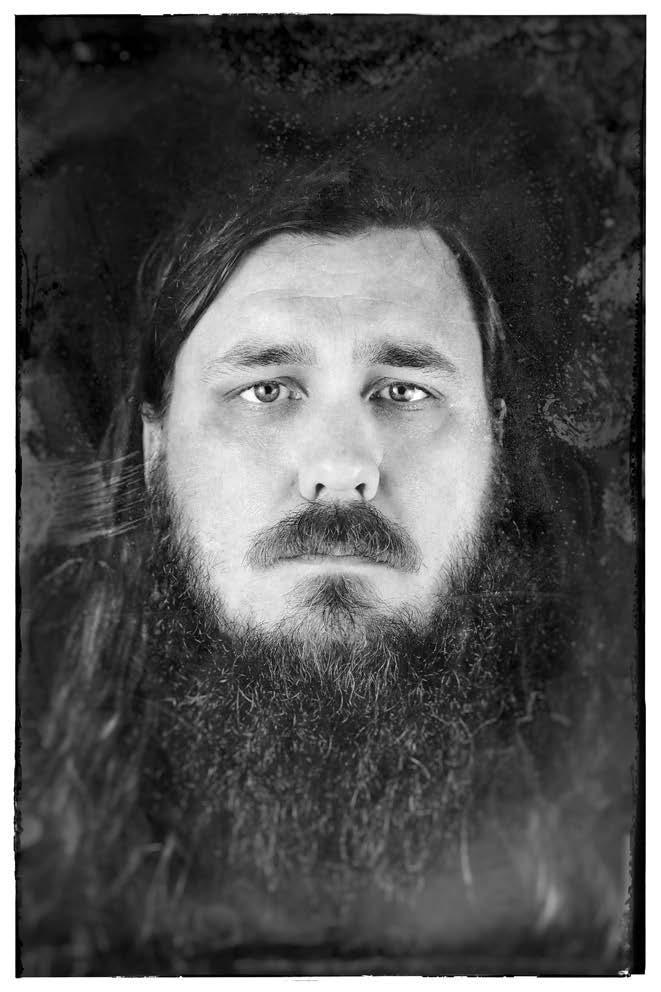
— Justin Wells
JW: [Love]. That’s the one word if I had to put one word on [this album]. I’m promoting the way I was raised. What I know is that if it starts with love, it will not fail you. It’s sitting down at this table with love for one another as a human being.
I come from two grandfathers that fought for this country in [World War II]. Flying the flag was a thing growing up. I also come from traveling all over this country and obviously seeing where things don’t work, things [that] specifically don’t work for people that don’t look like me.
Having said that, I do think that the cats that got together and decided, “Hey, we’re going to try this thing on this piece of land between Canada and Mexico,” I think they might’ve been onto something. What they were onto is that this [country] is an evolving thing. This is something we can figure out if we lay this groundwork a certain way. And I think we’re figuring it out right now — people need to be heard.
BY GARRET K. WOODWARD
Do you believe in what you see, motionless wheel, nothing is real
Stepping out of the muddy truck, I laced up my trail running shoes and disappeared down the Cataloochee Divide Trail for a few miles of trotting, wandering and pondering.
About a mile and a half up the ridge, there’s this small opening looking down into Cataloochee Valley. I always stop there and gaze out, wondering who else is, perhaps, looking back at me from one of those faraway peaks. Last Friday, I stood at that spot and felt the first crisp breeze of an impending fall.
It seems fall has been following me ever since I left Upstate New York after a whirlwind summer of nothing and everything. A couple weeks ago, I found myself in the depths of the Adirondack Mountains and the same crisp breeze greeted me while standing atop Coney Mountain near the small community of Tupper Lake.
On that summit of Coney, I couldn’t help but reflect on this past summer: of what was, what is, what could have been, and what did come to be. None of us on this planet could have forecasted what 2020 would turn out to be. There’s been this sense of confusion and sadness, like an endless stream of ghosts roaming the streets, trying to not only make sense of what has happened, but also grasp some form of normalcy in one’s daily life.
And yet, so many of us have been spending our days and our energy trying to seek out the silver linings in “all of this.” I know that I have been. I’m aiming to focus on what makes me happy, those simple things and situations in my existence that ground my mindset in happiness, passion, optimism and personal growth.
Luckily, I’m someone who had pretty much tied up all those loose ends in my mind many years ago, whether that be in reference to my personal and professional dealings. Case in point, it was exactly 11 years ago when I found myself in the Black Rock Desert of rural northwest Nevada for the Burning Man gathering.
This was 2009. I was 24 years old. With the U.S. economy in shambles and political fervor tearing the country apart, I found myself scraping by as a freelance writer, trying desperately to find creative and financial footing in the industry I wanted to work and thrive in. Living in my parents’ Upstate New York farmhouse, I took off for Nevada in hopes of finding myself: somewhere, anywhere, within, without.
I remember strolling the massive festival grounds amid a dust storm, barely able to see out of my goggles, and yet who cares? Wherever I landed or wound up, I would be OK, so long as there was a song in my heart and a kick in my step. If the intent is pure, then everything else is just a minor detail, eh?
There was a moment right when that dust storm passed, as the sun was falling to the horizon. I was standing atop this Carolina fishing trawler (that was trucked out into the desert as an art installation), just watching the tens of thousands of buzzing dots of humanity bounce off each other in every direction. The dots were now all glowing in darkness, and I couldn’t wait to meet and interact with every single one: in due time, in some place.
I realized back then what I felt justified this summer: I’m a writer and I want to share the beauty of the world around me with others through the written word. That’s all I’ve ever wanted to do and, thankfully, have kept doing these last 11 years (the last eight in Western North Carolina).
When I tied up that loose end in my mind back in 2009, in that Nevada desert, I knew that my mind, body and soul could push through any and all obstacles. Cue 2020. Here we are, and I return to that fishing trawler in my mind often, remembering the strength and persistence I discovered out

there and have possessed ever since.
Summer 2020 has come to a close, at least is does for me once Labor Day rolls around. Chaos and madness aside, I was able to not only find silver linings in my travels, but also within myself in the process.
I rediscovered the things that make me happy: writing, hiking, listening to (and learning to play) music. And, most importantly, circling back to quality time with friends and family, for that’s all that really matters in our universe: the love and memories you make and share with others.
I walk away from this summer with images of my niece blowing out the candles on her sixth birthday cake, my little sister walking down the aisle at her wedding, going for an afternoon hike in the Adirondacks with my parents, having a mar
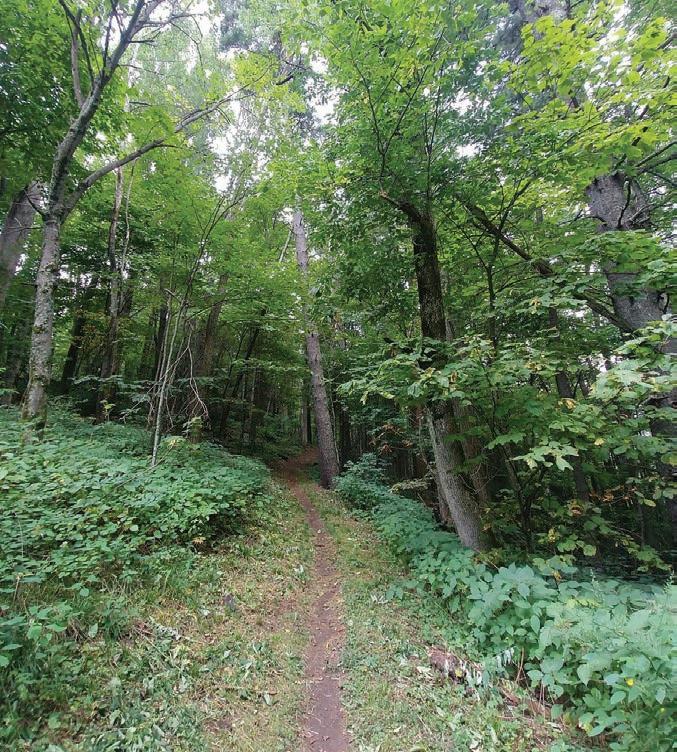
Cataloochee Divide Trail.
garita with my mother, trail running with my father, picking up a vintage guitar and learning how to play a few chords (over and over), and so forth.
The air is getting cooler outside my front door here in Southern Appalachia. Summer is slowly, but surely, transitioning into fall, as it has for all of time on this hurtling rock through space. Summer to fall, onward to winter and back around to spring. The seasonal cycle. The circle of life.
The clock keeps ticking, but who is even listening to that sound anymore? Step away from your computer. Go outside. Embrace the beauty around you. Immerse yourself in Mother Nature. Jump into a cold river. Raise your head towards the sunshine falling upon your harmonious vibration.
Life is beautiful, grasp for it, y’all.
WCU virtual art events
Although the Bardo Arts Center at Western Carolina University is closed to the public during the WCU fall semester due to COVID-19 restrictions, audiences will have the opportunity to enjoy a selection of virtual events and experiences, with a line-up of streaming events beginning in September.
The WCU Fine Art Museum is currently offering an interactive 360-degree virtual tour of the exhibition, Cultivating Collections: Paintings, Ceramics, and
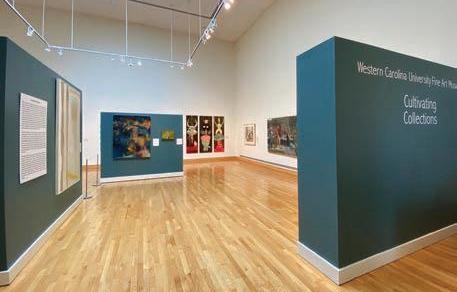
Works by Latinx and Latin American Artists. This multi-year series of exhibitions highlight specific areas of the WCU Fine Art Museum’s Collection, which includes over 1,800 works of art in a wide range of media by artists of the Americas.
In addition to the virtual exhibition 360-degree experience, enjoy a streaming video tour of the exhibition and a Q&A led by Museum Curator, Carolyn Grosch, at noon Wednesday, Sept. 2, live on Facebook
Grassroots Arts Sub-grants
The Jackson County Arts Council is now accepting applications for Grassroots
Sub-grants.
The JCAC administers the Grassroots
Arts Program Grant in accordance with Smoky Mountain News current guidelines, policies, and requirements outlined by the North Carolina Arts Council. Funding for these subgrants come from the North Carolina Arts Council, a division of Natural & Cultural Resources. The Grassroots Arts Program Subgrant provides financial support for Jackson County community groups and nonprofit organizations that offer programs and projects that enhance the arts for county residents. Grassroots Subgrants are awarded to organizations in all cultural disciplines through a competitive application and review process. The applicant organization must be based in Jackson County and produce its programming in Jackson County. Sub28 grants are not awarded to support and YouTube. Throughout the fall more virtual events will be available, learn more at arts.wcu.edu/cultivatingcollections.
The BAC Performance Hall has partnered with the Southarts Southern Circuit Tour of Independent Filmmakers to present a free documentary film series that audiences can watch in the comfort of their home. The films this fall are available to watch on browsers through computers and mobile devices, along with Rokus, Amazon Firesticks, SmartTVs and more through the app, “Eventive TV.”
Each stream is followed by a post-film interview with the film’s director and/or other member of the film crew. The film series opens with the documentary, Coded Bias, streaming at 7:30 p.m. Tuesday, Sept. 15, and 4 p.m. Sunday, Sept. 20. Coded Bias explores the fallout of MIT Media Lab researcher Joy Buolamwini’s startling discovery that facial recognition systems do not see darkskinned faces accurately, and her journey to push for the first-ever legislation in the U.S. to govern against bias in the algorithms that impact us all. Shalini Kantayya, the film’s producer and director, will be interviewed immediately following each stream. Learn more about this film, the entire series, and how to register for a free ticket by visiting arts.wcu.edu/filmseries.
Discover further virtual WCU arts events and experiences by visiting arts.wcu.edu/blog.
fundraising activities. Grassroots grants are matching grants that must be matched dollar-for-dollar by the receiving organization.
The JCAC is required to spend a set percentage of our Grassroots funding on Multicultural programming that reflects African American, Asian American, Latino, and Native American cultures.
To qualify for a Grassroots Multicultural Sub-grant, the artist or presenter and the content of the art material should both belong to one of the groups listed above. Any organization can apply for multicultural funds to conduct art programs/events that meet these standards. Fill out the regular application for multicultural funding.
Interested organizations can obtain application information at www.jacksoncountyarts.org or by email at info@jacksoncountyarts.org. The deadline for acceptance of applications is Sept. 15.
For more information, contact the Jackson County Arts Council at 828.507.9820 or by email at info@jacksoncountyarts.org.
Brad Heller (right). Lennie Duensing photo
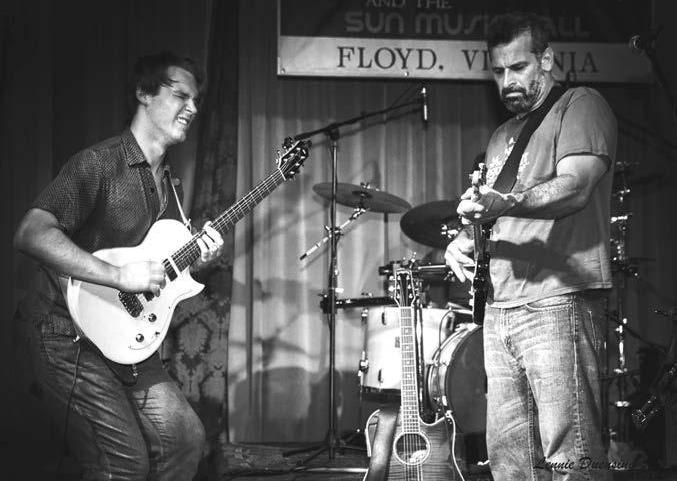
Singer-songwriter Brad Heller & The Fustics will perform at 6:30 p.m. Saturday, Sept. 5, at Frog Level Brewing in Waynesville.
Based out of Wilmington, Heller has resumed some touring in support of his criticallyacclaimed 2019 album, “The Sentence.” The group was voted Wilmington’s “Best Original Rock Band.”
The show is free and open to the public. www.froglevelbrewing.com. Sept 5. Free and open to the public. www.froglevelbrewing.com. • Lazy Hiker Brewing (Franklin) will host Larry
Cashiers Designer Showhouse
The annual Cashiers Designer Showhouse will run through Sept. 5 at 144 Cove Drive in Highlands.
Interior designers representing the Southeastern region will not only bring trending design to Cashiers, but will again create the magic that is the Cashiers Designer Showhouse.
redefining the areas surrounding the home and in turn creating serene and evocative late summer mountain gardens for showhouse strolling.
Throughout the week, showhouse attendees will admire the work of the talented designers; enjoy a variety of workshops, book signings and panel discussions from beloved creatives across the country.
Admission is $30. www.cashiershistorical society.org/showhouse.
• Elevated Mountain Distilling Company will host Outlaw Whiskey 8 p.m. Sept. 5 and
Western Carolina Writers w/Cody Siniard,
Jesse Frizsell & Nick Mac 8 p.m. Sept. 12.
Free and open to the public. www.elevatedmountain.com.
Leading area landscapers are involved in
Joe Lambert 7 p.m. Sept. 5 and Will James 7 p.m. Sept. 19. For a complete schedule of events, click on www.lazyhikerbrewing.com.
• Nantahala Brewing (Sylva) will host semiregular live music on the weekends. Free and open to the public. www.nantahalabrewing.com.
• The Great Blue Farms Brunch & Blooms will be held from 10 a.m. to 2 p.m. on Saturdays through Sept. 12 at ALSO: 1101 Briartown Church Road in Nantahala/Topton.
Admission is $75, which includes a tour, brunch, all flowers, supplies and container to take home your floral masterpiece. To register, click on www.greatbluefarms.com or call 828.508.1502.
• There will be a free wine tasting from 2 to 5 p.m every Saturday at The Wine Bar & Cellar in Sylva. 828.631.3075.
• The “Haywood County Medical Exhibit: 1870-1950” will be held at The Shelton
House in Waynesville. The showcase will run through October. Admission is $7 adults. $5 students. Children ages 5 and under free.
Admission includes Shelton House. 828.452.1551 or www.sheltonhouse.org.
On the shelf A train ride through Prohibition-era NC
“We are here on this earth separated from God, so that we might learn and grow.” — Jedidiah Robbins
If there’s anything to the bumperstickers that read “Buy Local” (and I think there is), then that not only applies to the food produced in our region but the literature too. Here in the mountains of the Blue Ridge, we have a poke full of writers who have gotten national, if not international recognition. I don’t even have to name them as they are now household names. And some of these names just happen to grace the Thomas Crowe Writer covers (front and back) of Terry Roberts’s novel, The Holy Ghost Speakeasy and Revival, as endorsements for this fine book. “Beautifully and vigorously written” (Charles Frazier). “Immensely gifted writer” (Ron Rash). “Delights and surprises ... in this picaresque narrative of loyalty and love in the mountains of North Carolina” (Robert Morgan). Need I say more? Yet I will.
In a novel that does, indeed, take us on a train ride and “picaresque narrative” through the mountains of Western North Carolina, by someone who has deep roots here, The Holy Ghost Speakeasy and Revival (great title) gives us a panoramic glimpse of life here in these mountains during the 1920s and during the Prohibition period in American history. Jedidiah Robbins is a revivalist preacher who heads up a big-tent revival train caravan he calls “The Sword of the Lord.” In an annual circular route through the various counties in Western North Carolina and surrounding states, he and his band of “roustabouts,” as he calls them, bring his version of the Christian gospel and his brand of local corn liquor to these thirsty mountain communities while making a lucrative living in the process. While being something of a “walking contradiction” as Bob Dylan phrased it, Jedidiah is not a charlatan, but a savvy businessman and devoted Christian — even if he is selling illegal bootleg liquor.
With his jerry-rigged train going from county to county like a carny show — with big top tent and the whole shebang — Jedidiah is more creative than he is criminal. Despite his nomadic “outlaw” lifestyle, he has good taste — in both how his railroad vehicles and tents look, as well as his interest in great literature. Early on, he’s already citing The Call of the Wild by Jack London and Horatio Alger to his 25-year-old daughter, Bridget, who is for all intents and purposes his business partner and “right-hand woman.” Later in the book, there is mention of Shakespeare and Aristotle, among others. Roberts’ storyline — which is local, readerfriendly and evocative of real and believable characters of “souls woven into souls”— starts off early near Marion, where Jedidiah soon finds himself in a McDowell County courtroom having been charged with illegal
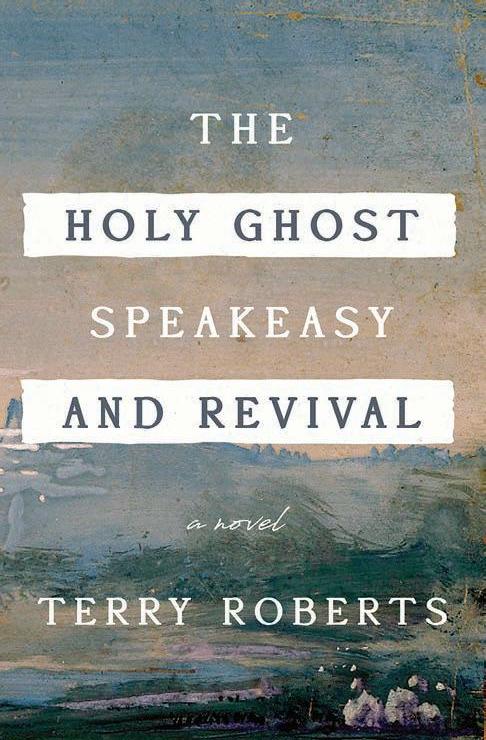
liquor sales. With the prosecuting attorneys with goods-in-hand and certain of conviction, Jedidiah proceeds to wow both judge and jury with an intoxicating sermon that ultimately leads to a verdict of not guilty and his release from custody with an enduring legacy and fame which will always be referred to as the “Courthouse Saloon Sermon.”
As part con-man and part spiritual seeker, Jedidiah soon has us on our way over to Hot Springs for a bit of a reprieve after all the courtroom drama, to a side-rail where the railroad cars are being re-painted and he and the crew are enjoying baths at the warm mineral springs. In fact, a lot of the action in this book takes place on railroad sidings or in old railroad barns — for purposes of both rest and refuge. Here, in Roberts’ own words:
“The troupe has settled into a comfortable pattern during its weeks at the Springs. There is ample rest and hot food, even for the roustabouts. Gabe and his crew repaint the words and images on the sides of the two trains. Boss and Fingers refresh their supplies of whiskey and brandy and lay in baskets of ginseng roots. Bridget accepts delivery on a shipment of new Bibles, which join the liquor in the Bible car ... she brews Jedidiah a cup of ginseng tea each evening, liberally laced with sugar and a teaspoon of whiskey, which she insists he drink before bed.”
The last half of the book is more focused on Jedidiah’s spiritual evolution in the midst of his adventures and travails here in our western counties as well as the love interests between his daughter and her new beau and himself and a woman named Cassandra. We journey to Asheville to the Masonic Temple on Broadway where Jedidiah gives the “I say unto you, it is easier for a camel to go through the eye of a needle, than for a rich man to enter into the kingdom of God” sermon to an unsuspecting and angry audience of welldressed and well-to-do Ashevillians. Then on to Morganton where we meet the famous Baltimore journalist and agnostic H.L. Mencken as he and Jedidiah spend a night in deep conversation over several glasses of brandy. Then on to Hickory and a fiery encounter with the KKK; a respite again in Hot Springs and then on to Johnson City, Chattanooga and Knoxville before traversing the Blue Ridge in a hurricane-like winter storm, only to arrive in a flooded Asheville and a heroic scene where Jedidiah risks his life to save several tannery workers from drowning in a collapsing building amidst a raging French Broad River. Finally we end up in Swannanoa “in the first flirtation of sun following the morning’s rain. The clouds are breaking, and they take pleasure in the clean rays of light striking down on the mountains” and words of deep-set scripture that say: “That which has been is now. And that which is to be hath already been. Love beareth all things. Now and then. In the truth endureth all things. The truth.”
Thomas Crowe is a regular contributor to The Smoky Mountain News and author of the award-winning non-fiction memoir Zoro’s
Field: My Life in the Appalachian Woods. He lives in Tuckasegee in Jackson County and can be reached at newnativepress@hotmail.com We are open
Magazines - Newspapers 428 HAZELWOOD Ave. Waynesville • 456-6000 OPEN Mon.-Sat. 9 AM to 3PM

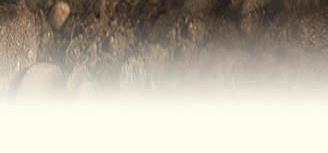



2 WEEK JOURNEY toSelf-Discovery with Amber Kleid

WHAT WE'LL EXPLORE: • Setting boundaries • Designing your future • You’re creative self • Simple acts of self-care • Simple acts of kindness • Mindful Eating & more! WHAT WE’LL WORK TO UNCOVER:
More self-awareness, What really holds you back, Unhealthy patterns, Abundance–because you’re worth it!
The realization that DAMN, you really DO deserve what you want!
This two-week program includes daily emails with insights, prompts and 3 group ZOOM calls, which will be recorded in case you’re not able to attend. Program begins Sept. 13.
See our website for more details. WAYNESVILLEYOGACENTER.COM Only $ 100 Limited spots available!










